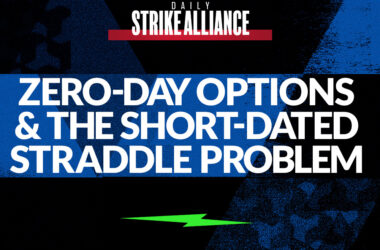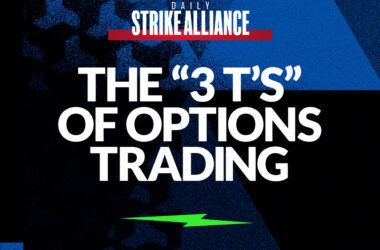Happy Friday, traders.
Ben here.
When you buy an option, do you know who is selling you the contracts? Many traders don’t.
The answer lies behind the scenes of the options market, where big, hidden players keep things moving…
I’m talking about market makers — individuals or entities who buy and sell options professionally.
There’s a lot of confusion about market makers — who they are, what they do, and why you should pay attention to them.
But here’s the truth: If you don’t understand their role, market makers might quietly move your money into their accounts.
Let’s make sure that doesn’t happen.
Today, I’ll explain everything you need to know about market makers (and how they fit into my trading philosophy)…
What Market Makers Do
Market makers are essential to the options market. Trading wouldn’t be as smooth without them, and your orders wouldn’t get filled.
When you buy options, market makers are the ones selling you those contracts.
Think of them as helpful employees in a huge, complex department store, always ready to help facilitate trades.
They provide liquidity and quote prices to both buyers and sellers, making sure trades can happen efficiently.
For example, if you buy ten $1.00 options contracts, a market maker just earned a $1,000 credit. If the contract expires worthless (below the strike price for calls, or above for puts), they keep that money.
Market makers are often large financial institutions on Wall Street, trading at huge volumes. But there are also independent market makers with large accounts.
They don’t focus on individual trades. For them, it’s all about volume — the more you trade, the more they make.
If options traders are like casino gamblers, betting on different moves in the stock market, market makers are the casino itself. They give us a table to play on by taking the other side of our trades.
You’ve probably heard the saying, “The house always wins.”
But, just like in a casino, you can win big with the right strategy and a bit of luck. The same goes for options trading…
Just look at what happened with GameStop Corp. (NYSE: GME) in 2021, when r/WallStreetBets traders caused massive losses for market makers and hedge funds.
In this case, trading isn’t roulette or blackjack — it’s more like poker, where skill matters more than luck.
How Market Makers Manage Risk
Market makers aren’t just taking the other side of your trades and hoping for the best. They manage their risk carefully through hedging — taking the opposite side of the contracts they’re selling.
For example, if a market maker sells you a call option, they may buy shares of the underlying stock to balance the risk. This hedging strategy helps them stay profitable without taking on wild, uncalculated risks.
Here are three more examples of how market makers manage risk:
The Bid-Ask Spread
Another key part of how market makers make money is through the bid-ask spread — the difference between the price buyers are willing to pay (the bid) and the price sellers are asking for (the ask).
The spread is essentially the market maker’s profit on a trade.
For example, if you see a bid price of $1.00 and an ask price of $1.10, that $0.10 difference is what the market maker profits.
Understanding the spread can help you be more aware of the real costs associated with your trades.
Liquidity and Volatility
Market makers play a huge role in maintaining liquidity — meaning they make sure there’s always someone on the other side of your trade.
But in volatile markets — like this one — things change. To protect themselves from big swings, market makers might widen the bid-ask spread or reduce the number of contracts they’re willing to sell.
Market Maker Obligations
Market makers also have obligations under exchange rules. They’re required to maintain liquidity by offering quotes for both buying and selling, even during fast-moving or illiquid markets.
While they do this to ensure the market functions, these obligations can also limit their actions in extreme situations.
This gives you insight into why there always seems to be a market maker on the other side, even when markets are moving quickly.
They play a critical role in keeping the market functioning, but they’re also bound by certain rules that can affect how they trade.
Why Market Makers Matter
As traders, we all need to stick to our rules and strategies. We rely on our systems, patterns, and setups day in and day out.
But remember, in the market, someone always wins, and someone always loses — especially in options trading.
We’re trading against market makers — the hidden forces that “make the market” by selling us options.
And they want to win, which means they want to take your money. It benefits them if we start to doubt our core trading beliefs.
When we begin to question these things, it shakes the foundation we stand on. If your core beliefs are shaken, fear sets in.
And when fear takes over your mindset, your ability to make rational, logical decisions shuts down. This is called the “fight or flight” response.
Market makers want to trigger this fear in us. They’re hoping you’ll panic, sell your contracts, and let them keep your money.
If we let them succeed, we lose. Worse, it can cause us to doubt the very strategies we’ve built.
That’s why it’s so important for traders to know their setups, have clear rules, and stick to them.
I always say: plan your trade and trade your plan.
When our hard-earned money is on the line, the fear of losing can push us to make rash decisions. But sticking to your battle-tested strategies will keep you grounded.
So, my message for you today is simple: Stand firm in what you know.
Execute your plan using the strategies you trust and trade every day. Don’t let your opponents shake out of your confidence.
And speaking of strategies I use every day, let’s look at:
💰The Biggest Smart-Money Bets of the Day💰
- $3.9 million bullish bet on AMZN 12/20/2024 $210 calls @ $4.25 avg. (seen on 9/12)
- $2.9 million bearish bet on BAC 02/21/2025 $40 puts @ $2.90 avg. (seen on 9/12)
- $2.5 million bullish bet on GE 09/20/2024 $175 calls @ $1.39 avg. (seen on 9/12)
Happy trading,
Ben Sturgill
P.S. If you want to stop making “earnings guesses” and start bagging earnings winners…
My brand-new specialized system for trading earnings has already delivered thirteen 100%+ returns…*
If you want access to this system — which can predict earnings moves before they happen — Click here now to join Operation: Master Calendar!
*Past performance does not indicate future results





